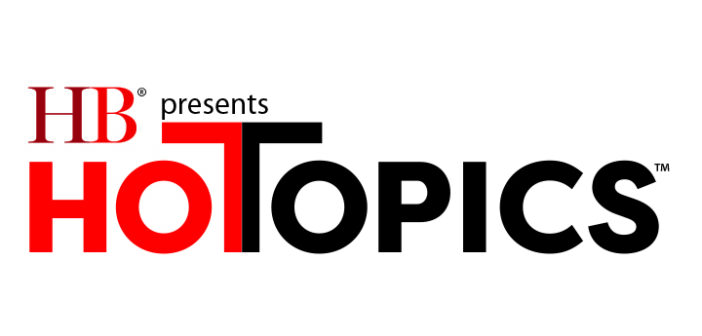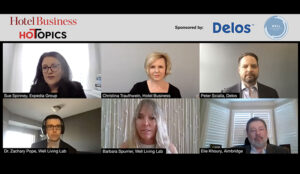With countless on-site amenities at hotels, it’s up to owners, operators and designers to come up with the latest and greatest to bring guests through its doors. State-of-the-art wellness facilities, eco-conscious efforts and smart technology have all been common differentiators, but as travel shifts, it has hoteliers asking: Is safety the new guest amenity?
During the latest edition of Hot Topics, wellness and industry professionals analyzed this very question. During the session, “Getting back to well: Restoring consumer confidence in travel,” with sponsor support from Delos, leaders discussed topics surrounding cleanliness, sanitation and brand trust, and how these are guiding the future of hospitality protocols.
Moderated by Christina Trauthwein, VP, content and creative, Hotel Business, the panelists included Peter Scialla, COO, Delos; Elie Khoury, EVP of operations, Aimbridge; Sue Spinney, VP, global ground transport, Expedia Group; Barbara Spurrier, executive director, Well Living Lab, a Delos and Mayo Clinic collaboration; and Dr. Zachary Pope, research scientist, Well Living Lab.
Sanitization procedures are no longer hidden behind closed doors. Hotel leaders are wanting—and even needing—to show how they are keeping their properties clean. New protocols and technology need not only be visible but, quite possibly, front and center, not unlike a shiny, new hotel amenity. But, that technology also needs to be effective.
“I think it’s all about transparency and accountability,” Scialla said. “Guests need to trust statements about best practices, but also that there’s been validation. Are these just claims by the stakeholder or have they been vetted through science? We need to raise public awareness about what to look for in addressing these concerns.”
Especially during a time when advances in science could be hospitality’s true saving grace, scientific proof is key, leading way to potential hotel partnerships and third-party accreditations.
“The idea of transforming anything, we can’t do that alone,” Spurrier said “Partnerships are critical. We keep learning about this [COVID and vaccinations]…it’s a complicated and evolving discussion.”
The struggle with how to approach vaccination requirements traverses all industries, but for hospitality, technology may be a good start toward increasing consumer confidence.
“We’ve educated our consumer about how to behave safely, and a lot of hotels and brands have touched on wellness with health programs,” said Khoury. “These are important to provide a safer place to stay, and we need to continue to focus on employees and associates. How do we promote wellness and safety in the buildings and continue to recruit and bring people back to work? Consumers are engaging through technology; we saw it with airlines, now it’s more prevalent in the hotel business.”
Communicating with consumers is essential, whether it’s through technology, marketing or, perhaps, through visible touchpoints.
“We need to give voice to actionable items born out of empirical research,” Pope said. “We, as scientists, have to be able to validate what we’re working with. Source control is ultimately the most important thing about any illness. We need to mitigate transmission with source control. If you take care of the air, you take care of the surfaces too.”
Air filtration is not a new science, Scialla noted, but hotels may want to rethink keeping filtration devices on the floor or hidden in a corner.
“Putting something on a wall that’s visible is marketing power but also backed by science that it’s more effective,” he said. “Air quality is key for meeting space. Even if folks who are sitting six feet apart. It’s about choosing the right technology that doesn’t have any harmful byproducts.”
Guests will take note of these safety touchpoints, Spinney said, and they don’t shy away from sharing their thoughts with other consumers.
“Health and safety are showing up more in reviews,” Spinney said. “Before consumers are arriving anywhere, they’re shopping. We’re making sure the communication piece is happening with new features, pre-registration so they can skip the counter… I think requirements will change. Getting ahead of reviews, responding to reviews and communicate is critical at this time.”
Scialla said that the health-safety category is just the tip of the iceberg with hotels getting third-party accreditations. “Once they’ve done all that, there will be hotels that take a bigger bite out of the category [and ask], ‘What can I message to guests that I am serious about health and wellness and this wasn’t just a response [to COVID]?’”
Having wellness partnerships can be a major benefit to hoteliers as well who are looking for additional ways to gain trust and confidence among guests.
“When we first looked at the hotel sector, it wasn’t all about air quality; wellness as a demand driver had some legs—travel seeking not just clean and safe, but the whole wellness experience,” Scialla added.
Khoury noted that reviews and education will be dominant vehicles for consumer trust as customers are more vocal about wellness than ever before.
“We’re starting to realize the importance of third-party accreditation and ROI,” Khoury said. “Give owners the option to participate.”
He added, “Keep the hospitality and service aspects intact. In meeting spaces, we still think it’s important to have consumer confidence. Presenting and showcasing how we’re keeping guests and associates safe on top of the right equipment. Food service is done differently…We’re being thoughtful about safety. We learned quite a bit from the pandemic. We need to add more touchpoints than we have in the past.”
Khoury noted that education can also be used to promote testing and vaccines, but the industry still has a long way to go before it requires guests to be vacinated.
“I’m not sure if we would be able to do that from a legal perspective. It’s a slippery slope. We need education as things evolve and as the science changes,” he said.
Pope believes that COVID will likely become an endemic much like the seasonal flu with upticks as the seasons change, but that this can work in the industry’s favor. Meaning, the solutions are here to stay as well like the vaccines and other preventative measures.
But the burning questions still linger: When will we get back to normality? And, once travel resembles ‘normal’ numbers, will vaccines be required?
Pope said that the most recent data suggests that by mid to late summer things will begin to resemble “normal,” and that we’re in one of the best places we’ve been from a pharmaceutical and solutions side. As for vaccine passports and employee requirements, the answer may not be as clear.
“I wish there was an easy answer to this question,” Pope said. “There’s so much contact in our studies so it’s necessary [to be vaccinated]. In travel it’s different. If you require vaccinations internationally or domestically, you risk inequalities. The question becomes—from my perspective as a scientist—how do we deal with controlling mitigation from as close to the source as possible and then communicate that effectively? People want to know what you’re doing that protects them. At the end of the day in hospitality, that’s what’s most important.”




